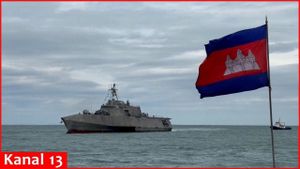The controversy over the depiction of Crimea on the Ukrainian television promotional material has sparked significant public backlash, driving responses from both Kvartal 95 and the 1+1 network. The incident unfolded during the announcement for the New Year's episode of the comedic show "Evening Quarter", which featured a map of Ukraine. Viewers quickly noticed the absence of clear outlines for Crimea, which has been under Russian occupation since 2014, leading to widespread criticism.
According to recent coverage, the promo video initially displayed Crimea without identifiable borders. The portrayal was met with outrage from many Ukrainians who saw this as not just an oversight but as disrespectful to the national integrity. The promotional material circulated on social media and was highlighted by various news outlets, inciting conversations about the political implications of such representations.
Facing mounting pressure, the creators at Kvartal 95, which was co-founded by President Volodymyr Zelenskyy, were quick to respond. They have since released updated footage to clarify the visual presentation of Crimea on the map. A representative of Kvartal 95 commented humorously, "Зрада отменяется) Увеличили контрастность, чтобы Крым увидели все, у кого резко 'ухудшилось зрение'. Мы не офтальмологи, но между 'почти не видно' и 'нет' есть разница, как и между лидерами мнений и искателями измены." This translates to them jokingly dismissing accusations of betrayal as they increased the map’s visibility for those who may have struggled to see it properly.
The 1+1 channel similarly addressed the criticisms. They thanked viewers who pointed out the initial discrepancies, reinforcing their stance on Crimea's rightful place within Ukraine. Their official statement reaffirmed, "Крым был, есть и будет оставаться украинским на наших картах и в наших сердцах," indicating their commitment to represent Crimea as Ukrainian territory. They also explained the technical issues cited, mentioning, "Из-за 'технических особенностей применения визуальных эффектов' в предыдущей версии промо-ролика очертания Крыма 'могли выглядеть нечеткими'." This statement clarified the reasons for the unclear representation, attributing it to the limitations of visual effects rather than intent to misrepresent.
Despite the updates and clarifications offered by both entities, the incident continues to resonate among Ukrainians. It symbolizes not only the cultural significance of Crimea but also highlights the sensitivity surrounding representation of occupied territories, which can evoke strong emotions related to national identity and sovereignty. Many feel the need for greater awareness and responsibility from media representatives, especially those linked to the government.
Above all, the controversy underscored the necessity for vigilance and critique from the public, reflecting on how deeply personal and contentious issues like territorial integrity remain for many citizens. The immediate backlash against Kvartal 95 and 1+1 demonstrates the public’s readiness to confront perceived disrespect, particularly concerning matters so closely tied to national pride.
Moving forward, the fallout from this incident can serve as points for media analysts and cultural scholars to dissect how media presentations impact public perceptions of significant geopolitical issues. Increased public scrutiny could encourage greater responsibility from creators and media outlets when conveying sensitive subject matter.
With Crimea's status still under dispute, the integrity of maps and their representations will likely remain pivotal discussion points. Ukrainian audiences appear poised to challenge any visual narratives they perceive as undermining Ukraine's territorial claims, promoting discussions about geographical awareness and representation.



